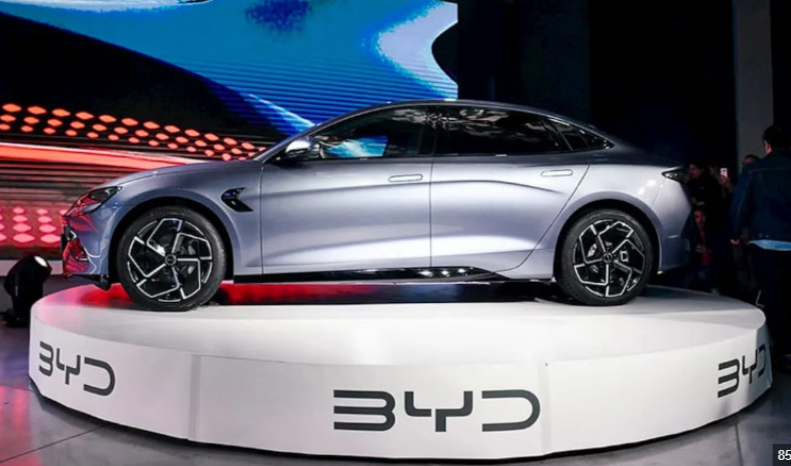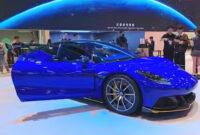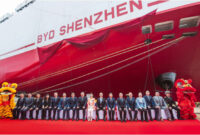Chinese electric vehicle leader BYD has reported a 60% increase in sales during the first quarter of the year as its main competitor Tesla faces challenges.
The Shenzhen-based EV manufacturer sold just over one million new-energy vehicles in the first quarter of 2025, which includes battery-electric cars, hybrids, and commercial vehicles, according to a calculation by CNN based on its latest filing with the stock exchange. Sales of fully electric vehicles jumped 39%, exceeding 416,000 units.
BYD has been experiencing significant growth. Recently, it announced a record annual revenue of $107 billion last year. In comparison, Tesla’s revenue for 2024 was $97.7 billion, and it experienced its first annual decrease in deliveries, down 1.1%.
The vast majority of BYD’s shipments last year were to domestic customers, with only 10% going to international markets. Consequently, investors and analysts are optimistic about BYD’s potential for growth as the automaker expands in Europe, Southeast Asia, and South America.
In Europe, where BYD is establishing a presence and building two manufacturing sites, Tesla is facing declining sales. In February, Tesla’s sales in that region fell about 40% compared to February 2024, as reported by the European Automobile Manufacturers’ Association.
Recently, BYD’s founder and CEO, Wang Chuanfu, vowed to increase total shipments by almost 30% this year and nearly double its overseas deliveries to over 800,000 vehicles, according to state media.
In the first quarter, BYD introduced several striking innovations. Last month, it revealed a groundbreaking battery charging technology that reportedly adds 250 miles of range in five minutes—surpassing Tesla’s Superchargers, which provide 200 miles of range in 15 minutes. In February, BYD launched an advanced driver-assistance system that competes with Tesla’s Full Self-Driving feature, offering it free of charge for most of its models.
There’s heightened focus on autonomous driving technology in China this week following a tragic highway accident involving Xiaomi’s popular EV sportscar over the weekend, which has ignited online discussions about the safety of these systems.
Xiaomi, a well-known tech company for its smartphones, stated in an online announcement that its intelligent driving assistance system was active before the crash that resulted in three fatalities. The company pledged to fully assist with the police investigation. CNN has reached out to Xiaomi for a statement.
As for BYD, while its passenger vehicles have yet to enter the US market due to 100% tariffs on Chinese EVs, it is emerging as a strong competitor to the previously dominant Tesla, especially in China, the world’s largest automotive market.
In the first two months of this year in China, sales of BYD’s new-energy passenger cars increased by 25%, solidifying its lead with a 27% market share, according to data from the China Passenger Car Association. In contrast, Tesla’s passenger car sales declined by 14%, placing it sixth with only a 4% market share.
Last month, BYD’s Executive Vice President Stella Li informed a German automotive publication that the company is considering the establishment of a third manufacturing facility, in addition to the ones in Hungary and Turkey.
However, BYD’s push for international expansion faces challenges, as it continues to deal with issues such as brand recognition and trade barriers, according to Shaochen Wang, a research analyst at Counterpoint Research, which analyzes market trends.
In Tesla’s home market, Elon Musk’s controversial role in government, characterized by mass public-sector layoffs as head of the Department of Government Efficiency, has dampened Tesla sales. While demand for used EVs is rising, prices of used Teslas are falling sharply.
Musk’s government involvement has sparked considerable backlash, including vandalism directed at Tesla showrooms, charging stations, and vehicles across the US, along with peaceful demonstrations at Tesla locations worldwide.
Consolidation appears imminent after years of fierce competition in China’s auto industry. Dongfeng Motor and Changan Automobile, two of the largest car manufacturers in the country and joint venture partners of Ford and Nissan in China, are reportedly engaged in advanced merger discussions, according to The New York Times, citing unnamed sources.
In February, each company separately announced that it was in talks with other state-owned enterprises regarding potential restructuring, according to Chinese state media. If the merger is finalized, it could create the largest carmaker in China and the fifth largest globally.
Shaochen Wang noted that China’s automobile market is overcrowded and has too many domestic brands. Many are expected to exit due to the financial strain of research and development costs on manufacturers.
“The merger of Dongfeng and Changan primarily aims to seek more efficient utilization of state-owned assets as market competition intensifies,” he explained.
Tesla sales plunge: Biggest decline in history
Tesla experienced a 13% decrease in sales during the first quarter of this year, marking the highest decline in deliveries in its history, driven by backlash against CEO Elon Musk and increasing competition that significantly impacted demand for its electric vehicles.
The company announced on Wednesday that it delivered 336,681 vehicles in the quarter, which is 50,000 less than in the same period last year. This represented Tesla’s worst sales performance in nearly three years.
Protests have taken place outside Tesla showrooms from individuals opposed to Musk’s actions in his other position as head of the Department of Government Efficiency, as well as the policies associated with Donald Trump’s presidential administration. There have also been cases of vandalism targeting Tesla facilities, including charging stations and some vehicles. Such incidents may have discouraged potential buyers from proceeding with their purchases.
While Tesla did not address the protests in its sales announcement, it did highlight that an update to the Model Y during the quarter led to a temporary suspension of production at all four factories for several weeks.
“We appreciate all our customers, employees, suppliers, shareholders, and supporters who contributed to achieving these results,” the company stated.
The decline is remarkable for a company that had recently been reporting year-over-year sales growth ranging between 20% and 100% almost every quarter, a trend significantly contributing to its high stock price. Tesla’s first moderate drop in quarterly sales occurred only during the pandemic in 2020 when production and deliveries were hampered by shutdowns.
Last year, however, saw Tesla report its first annual drop in sales, which accelerated in the opening quarter. The decline was steeper than what Tesla analysts had anticipated, who had predicted quarterly sales would reach as low as 350,000.
After the presidential election, Tesla shares experienced a nearly 100% increase in value based on expectations that Musk’s close affiliations with Trump would lead to favorable policies for the company, but have since dropped 44% from their peak in December. Following the sales report, Tesla shares (TSLA) fell about 2% in early trading but quickly recovered upon news from Politico that Musk intends to reduce his official role in the Trump administration while possibly remaining as an informal adviser.
Concerns persist among analysts that Musk’s activities outside Tesla are negatively impacting the company.
“The market and we anticipated a challenging first quarter, but this was even worse than expected,” stated Dan Ives of Wedbush Securities, who remains optimistic about Tesla, in a client note on Wednesday. “This quarter illustrates the harm Musk is inflicting on Tesla. This situation continues to represent a critical moment for Musk to manage this brand turmoil and emerge from this difficult phase for Tesla.”
Due to Musk’s prominent and confrontational public persona and his social media remarks, he has become a figure of contention for those opposed to Trump administration policies.
A CNN poll conducted last month indicated that only 35% of Americans view Musk positively, while 53% have a negative opinion of him, making him more widely recognized and significantly less popular than Vice President JD Vance (rated favorably by 33% and unfavorably by 44% of Americans).
These negative perceptions of Musk are influencing how people view Tesla, particularly among individuals identifying as liberals. This demographic is most inclined to consider purchasing a green electric vehicle.
Polling data suggests Tesla’s popularity is declining. A February survey by Morning Consult revealed that nearly 32% of US consumers “would not consider” buying a Tesla, an increase from 27% in a similar survey a year prior and up from 17% in 2021.
S&P Global Mobility, which monitors sales on a state-by-state basis, reported a significant shift in customer loyalty between “blue states,” which have voted for Democrats in the last four presidential elections, and “red states,” where Republicans have prevailed.
In blue states, the proportion of existing Tesla owners opting for another Tesla dropped to 65% by the end of 2024, down from 72% the previous year. Conversely, repeat buyers in red states saw a slight increase from 47.6% to 48.2% over the same period.
Tesla does not provide specific sales figures by region. However, sales in Europe dropped by 49% in the first two months of the quarter, according to the European Automobile Manufacturers’ Association, despite a 28% increase in overall EV sales in the region.
This decline may stem from opposition to Musk in Europe, as a result of his outspoken support for far-right political parties in Germany and the UK.
Even aside from the political issues, Tesla is encountering challenges due to increased competition from other car manufacturers, especially those based in China.
China, being the largest market for electric vehicles, is Tesla’s second largest market after the United States. The Chinese automaker BYD reported selling over 416,000 purely electric passenger vehicles in the quarter, marking a 39% increase from the previous year, and surpassing Tesla as the top seller of EVs globally.
BYD has outperformed Tesla in EV sales for several quarters in recent years, although Tesla has consistently led in full-year sales figures. However, if current trends continue, Tesla is likely to lose that title in 2025.
Generally, BYD’s electric vehicles are more affordable than Tesla’s, along with other benefits. Earlier this month, BYD announced a new charging system that claims to provide its latest EV model with a range of 250 miles after just five minutes of charging.
Despite the competitive landscape overseas, BYD and most other Chinese electric vehicle manufacturers do not operate in the U.S. market.



